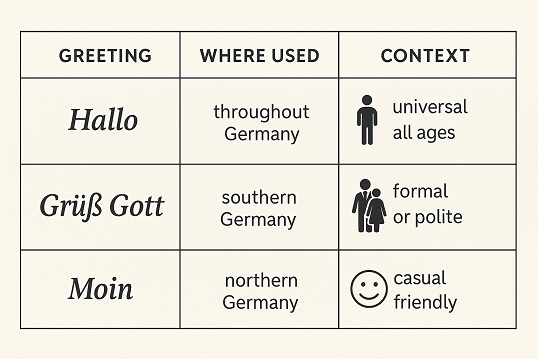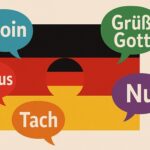
Saying Hello in Germany: The Rules of Grüß Gott, Moin, and Hallo
In Germany, saying hello isn’t just about politeness – it’s about place, context, identity, and social intelligence. What sounds natural in Hamburg might sound absurd in Munich. A cheerful “Moin” in Stuttgart could raise eyebrows, while a formal “Guten Tag” among friends might feel stiff. Greetings are loaded with subtle cues, and knowing how to use them is a powerful tool for anyone navigating German society.
This guide introduces the most common ways Germans greet one another, explains how regional and social factors influence which greeting you should use, and explores why even a simple “Hallo” isn’t as universal as it seems.
Whether you’re visiting Germany, moving here, or just fascinated by the intricacies of German culture, mastering local greetings is one of the simplest and most telling ways to show respect and blend in.
Germany’s Most Common Greetings – And Why They’re Not All the Same
At first glance, greeting someone in Germany may seem easy. Say “Hallo,” smile, and you’re done – right?
Not quite.
Unlike in some cultures where “hi” works in nearly every situation, Germany has developed a complex system of greetings that change according to:
- Region (North vs South, East vs West)
- Time of day
- Formality (age, rank, workplace hierarchy)
- Relationship type (friends vs strangers)
What makes it even more interesting is that these greetings are often subtle indicators of a person’s background, mindset, or social group. Germans may not consciously analyze every greeting, but they instantly recognize when something sounds “off.”
Regional Greetings: North, South, East, and West
Germany’s strong regional identities have given rise to distinctive local greetings – each with its own rhythm, style, and history.
Southern Germany: Grüß Gott, Servus, and Griaß di
In Bavaria and parts of Austria, Grüß Gott (literally “God greet you”) is the standard formal greeting – used in shops, on the street, and in most public situations. It may sound overly religious to outsiders, but it’s considered entirely secular in southern Germany.
Informally, people also say Servus or Griaß di – the latter being dialect for “greetings to you.” These greetings have a warm, almost rustic flavor, rooted in rural and Catholic traditions.
Learn more:
➡️ Grüß Gott! Why Southern Germany Greets Like It’s Still Sunday
Northern Germany: Moin and Moin Moin
In Hamburg, Bremen, and Schleswig-Holstein, you’ll hear Moin – sometimes doubled as Moin Moin. Though it resembles “morning,” locals use it all day long. It’s short, friendly, and deeply embedded in Northern German identity.
Try saying Grüß Gott in Kiel and you’ll likely get a smirk – the greeting signals you’re not from around here.
Learn more:
➡️ Moin! The Northern German Greeting That Works Any Time of Day
Western Germany: Guten Tag and Tach auch
In Cologne, Düsseldorf, and the Ruhrgebiet, you’ll mostly hear Guten Tag or its more casual cousin Tach. These greetings are more standardised and less charged with regional pride than in other parts of the country. However, dialectal variations like Tachchen or Jo! still exist and reflect a relaxed, humorous social style.
Eastern Germany: Guten Tag, Na?, and Tagchen
The former GDR regions — Saxony, Brandenburg, Thuringia – tend to use Guten Tag in formal settings, while Na? is an extremely brief informal greeting that often replaces full hellos among peers. You might also hear Tagchen or Hallo in urban areas like Leipzig or Dresden.
Each of these regional greetings is more than a word – it’s a signal of belonging.
Formal vs Informal: When “Hallo” Might Not Be Enough
German is a language that sharply distinguishes between formal (Sie) and informal (du) relationships – and greetings reflect this divide.
Formal Greetings
Use these in professional, unfamiliar, or respectful contexts:
- Guten Tag – Good day
- Guten Morgen – Good morning
- Guten Abend – Good evening
- Grüß Gott – Southern formal default
- Wie geht es Ihnen? – How are you? (formal)
Informal Greetings
Use these with friends, peers, and young people:
- Hallo – Hello
- Hi – Casual English borrowing
- Na? – Very casual, often used without context
- Servus – Informal in the South
- Moin – Northern default, works with almost anyone informally
Understanding these distinctions helps avoid social faux pas. For example, saying Hi to your new professor might sound rude, while using Guten Tag with a close friend might feel uncomfortably formal.
For a full breakdown:
➡️ Hallo, Guten Tag, or Hi? When to Use Formal and Informal German Greetings
Greetings as Social Signals in Germany
Germans often say they don’t like small talk – and that’s partly true. But greetings? Greetings are not optional. Whether you’re entering a shop, starting a phone call, or greeting your neighbors in the hallway, a short hello is expected.
In fact, failing to greet someone (especially in small towns or enclosed spaces like waiting rooms) can be seen as rude, antisocial, or even suspicious.
Greetings are also:
- A sign of education and proper upbringing
- A marker of regional identity
- A tool to gauge formality, familiarity, and even political attitude (yes, really)
In one region, Grüß Gott might suggest tradition and conservatism; in another, Na? might be the marker of relaxed, urban youth.
Curious about what your greeting reveals about you?
➡️ What Your German Greeting Says About You: Identity, Region, and First Impressions
Why Using the “Wrong” Greeting Actually Matters
While most Germans won’t correct your greeting (unless they’re your language teacher), using the wrong one can subtly shift how you’re perceived. A Grüß Gott in Berlin? You’ll raise eyebrows. A Moin in Munich? People will chuckle. A Na? in a job interview? Risky.
The better you match your greeting to your context, the more natural and respectful you’ll sound – and the easier it will be to connect with locals.
Mastering greetings won’t just help you make friends – it’ll help you understand German society from the inside out.
Key Takeaways
- Greetings are regional: From Moin in the North to Grüß Gott in the South, knowing the right hello helps you fit in.
- Formality matters: Use Guten Tag in formal settings, Hallo or Na? with friends.
- They’re social tools: Greetings reflect identity, upbringing, and belonging.
- Silence is not polite: Always greet in stores, offices, and even elevators.
- One size doesn’t fit all: What works in Cologne won’t always work in Nuremberg.
Related Articles:
- Grüß Gott! Why Southern Germany Greets Like It’s Still Sunday
- Moin! The Northern German Greeting That Works Any Time of Day
- Hallo, Guten Tag, or Hi? When to Use Formal and Informal German Greetings
- What Your German Greeting Says About You: Identity, Region, and First Impressions
- Du or Sie? Navigating Formality in German Conversation







